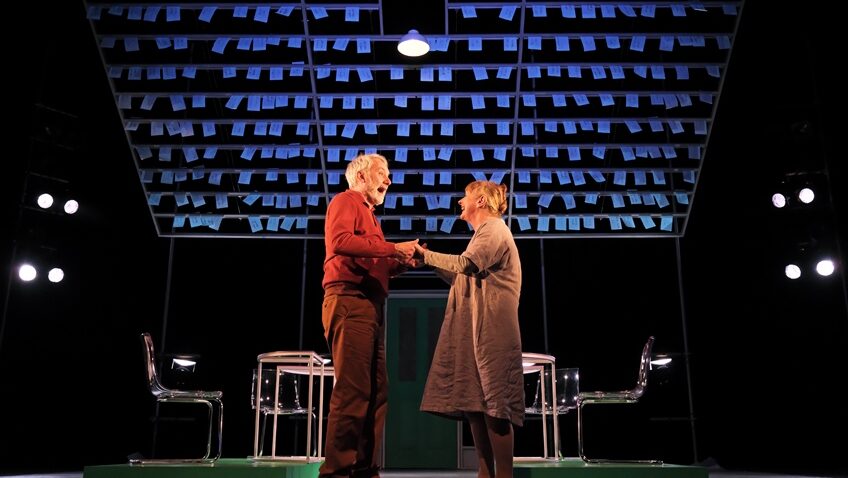Standing ovations followed the moving finale of Maggie May, a neat, 2-act play by Frances Poet, beautifully acted, and funny, sunny and uplifting in spite of also dealing with times of dark despair and extreme sadness. It all goes to show how laughter, song, love and acceptance go a mighty long way in turning dire situations and distress into times of joy and hope.
Rod Stewart’s Maggie May was the big hit of the day when Maggie first met husband Gordon in 1971. Now they’re in their sixties, Gordon’s recovering from a stroke, and Maggie’s struggling like a madly paddling swan to appear perfectly composed while desperately trying to hide from her son and her best friend the fact that she’s having episodes of memory loss owing to the onset of Alzheimer’s. Ashamed and embarrassed, she’s distraught at the thought of how they’ll react. We soon find out as, through the interactions of five characters, Maggie’s story and relationships unfold and develop.
Eithne Browne is totally engaging and endearing as Maggie, a down-to-earth Leeds woman, full of humour and song, who’s suddenly faced with the challenges of a dementia diagnosis. With her we travel on a bucking bronco ride from lucid, logical times into mortifying brain fogs, desperate coping strategies and cover-ups, denials, frustrations and despair, but gradually, we move forward from the tears of anguish. Once Maggie and those who love her face up to and accept the challenges of reality, they start to focus on the positive and revel in the joy of the moment, thinking about what can still be achieved instead of what can’t.

Son Michael (Mark Holgate), thanks to lovely Claire (Shireen Farkhoy), his kinder, more understanding on/off /on girlfriend, eventually works through his incomprehension, denial, intolerance, impatience and exasperation to mellow into accepting his mum’s situation and gets ready to play his part in helping. Maggie’s best friend Jo (Maxine Finch) must learn to forget stigmatising dementia stereotypes and do the same. Husband Gordon (Tony Timberlake) is a warm, loving, very loveable man, ever ready to sing, dance and have a laugh with the love of his life as they face their trials and tribulations together. Music regularly punctuates scenes, changing Maggie’s dark despair into times of joy and levity, at the same time lifting audience mood with doses of happy sunshine. Bursts of songs, jokes and humour pepper the entire play.
The set is wonderfully uncluttered and pleasing with clear, geometric lines formed by the angular metal frames of beds and tables, and an attractive green front door, all of which are slickly mobile. A stage-wide metal frame, pegged with hundreds of reminder notes, hangs at a slope above the proceedings, playing a huge part in the story and creating some fabulously touching visual magic, especially at the end. Lighting is also simple but highly effective while a continuous frieze frames the entire stage, depicting rows of terraced houses, the homes of ordinary people like those in the story. Everything, in fact, has been thoughtfully devised for dementia-friendly audiences, and at intervals the script has Maggie put her brain and memory in gear as she reminds herself – and us – of the situation of the moment. Her clear, summarising words also appear on two screens, where they remain throughout the scene.

Perhaps unexpectedly, Harry Potter metaphors feature large. A huge, hovering, dark spectre appears to Maggie, a Dementor, come to suck out her soul, take away her memories and leave behind an empty shell. But Maggie banishes it! She defeats it, choosing instead to take up Gordon’s idea of creating a Pensieve, where she can store her treasured memories. Super-innovative Gordon hands Maggie a screwdriver to use as a wand to pull golden memories from her mind and then place them inside his emptied-out toolbox. Here they’ll be stored and shared forever, and the toolbox glows with magical light.
So, rather than being about loss, decline and becoming a burden, this is a decidedly sunny, positive play, a happy entertainment that offers hope and comfort and emphasizes the message that, even if people forget with their brains and even fail, sometimes, to recognise loved ones, in their hearts and beings they still feel the love.
As friends and family rally to help, Maggie realises she’s neither helpless nor useless and sees that, in spite of tears and anguish, she will keep going, keep laughing, keep singing and dancing and joining in, and keep enjoying the good things each present moment may bring. A good philosophy.
Eileen Caiger Gray
Maggie May is a Leeds Playhouse, Curve and Queen’s Theatre, Hornchurch co-production and runs at Leeds Playhouse until May 21st and then at The Queen’s Theatre from 24th until 28th May. All performances are dementia-friendly.




